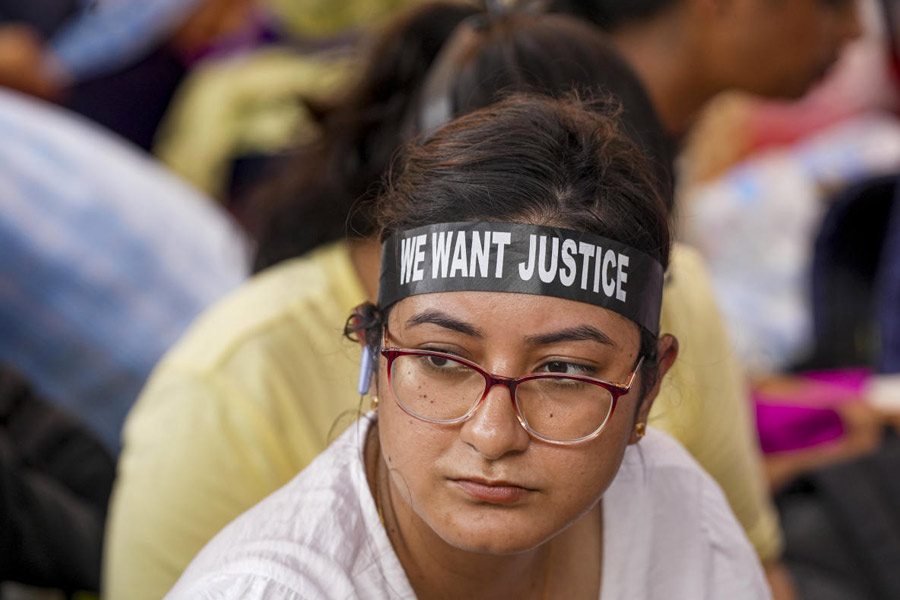The junior doctors said on Thursday evening that they were still open to dialogue but blamed the state administration for the talks failing to take off.
The meeting between the doctors and chief minister Mamata Banerjee could not be held as the medics stuck to their demand for live-streaming and the government refused to give in to the condition. “We still believe a resolution to the deadlock will come through discussions. We are ready to talk any day and at any location,” said Arnab Mukherjee, one of the junior doctors who had reached Nabanna.
“We did not come here to talk point-by-point about the sub-judice matter. We came here to talk about our five demands,” Mukherjee added.
“We have faith in this building (state secretariat Nabanna) and in the chair (chief minister). We at the West Bengal Junior Doctors’ Front still believe that dialogue will bring an end to this impasse,” Mukherjee said before the junior doctors left Nabanna and headed back to the road outside Swasthya Bhavan where they have been squatting since Tuesday afternoon.
“We will continue our movement,” he said.
Mamata told a news briefing that live-streaming could not be done because the matter was sub judice.
Sekhar Basu, a senior advocate at Calcutta High Court, found logic in the state government’s decision and said the chief minister could not have commented on a matter that was under investigation if it cropped up during the discussions.
Several junior doctors said they were demanding live-streaming because hundreds of them have been part of the protests for over a month and deserved to be witness to what transpired at the meeting.
“When so many senior officials are talking about the case in media conferences, what was the problem in live-streaming the discussions between the chief minister and the junior doctors?” asked a protesting doctor. “There is transparency involved in live-streaming the discussions,” said the doctor.
The state government had agreed to record the discussions but not live-stream the session.
Senior advocate Basu supported the state government’s decision. “The chief minister will not be able to comment on a matter that is under investigation or under trial. Any of the parties in the meeting might have brought up issues related to the investigation. The chief minister commenting on it and it being live telecast could prejudice the investigation,” Basu said. “I think the state government took the right decision not to live-stream the meeting.”
The protesting doctors also contested the chief minister’s claim that junior doctors were receiving instructions from outside and that these “outsiders” had advised them against attending the discussions. “We are not kids that someone else would be dictating us what to do and what not. No one was instructing us about whether to attend the meeting or not,” said a junior doctor.
Responding to Mamata’s comment that the junior doctors were not seeking justice but the chief minister’s chair, the protesters said they had never demanded her resignation. “We have never demanded her chair,” said a junior doctor.
The junior doctors also said that the email from the chief secretary on Thursday afternoon was the first time they were clearly told that the chief minister would be meeting them. “The previous two emails did not say that clearly,” said Mukherjee, the postdoctoral trainee.
The junior doctors reached Nabanna a little after 5pm on Thursday after chief secretary Manoj Pant invited them to a meeting. They left around three hours later. Before leaving, they said they would not budge from their five demands.
The demands are identification of “all culprits” and their arrest along with a clear word on the motive of the crime; the resignation of Kolkata Police commissioner Vineet Goyal; disciplinary action against former RG Kar principal Sandip Ghosh; ensuring the safety of doctors and all healthcare workers; an end to the “reign of fear” at medical colleges; and the resignation of the health secretary, director of medical education and the director of health services.
During the news briefing, Mamata said several people had died because of lack of treatment during the ongoing cease-work. She spoke about a mother who donated her kidney to her son but died after the catheter was not replaced. The junior doctors responded by saying that if people were dying because of the cease-work, it only showed the state of healthcare in Bengal.











